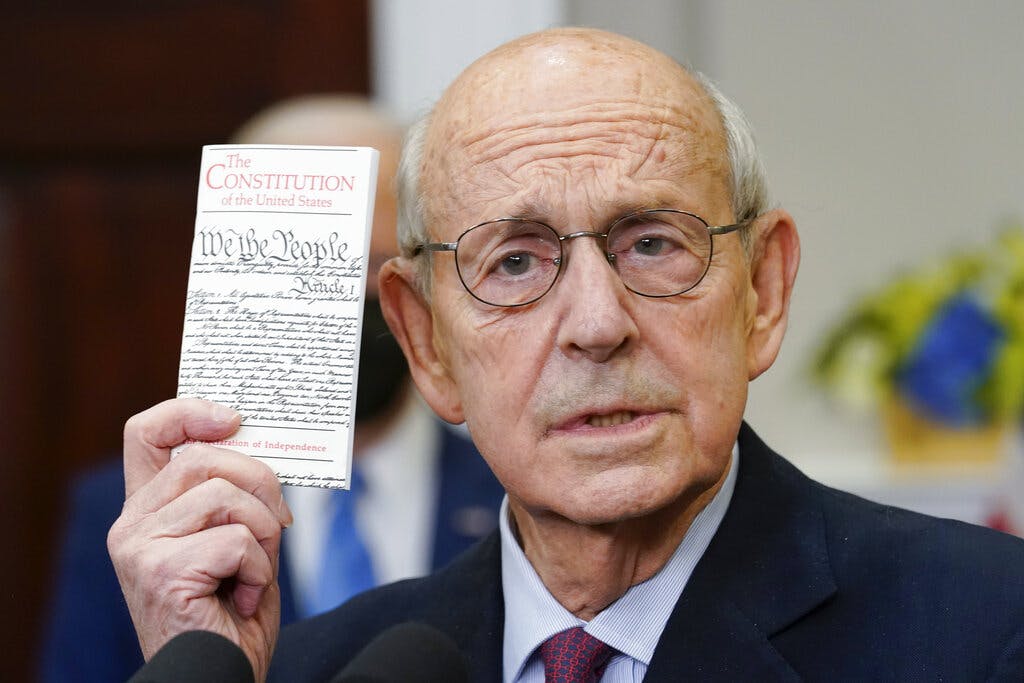At Breyer’s Final Day of Supreme Court Arguments, Last Chance for ‘Evocative’ Hypotheticals
He was at it once again Tuesday, inventing a prison inmate named John the Tigerman in a case involving transporting an inmate for a medical test.

WASHINGTON — The fertile mind of Justice Stephen Breyer has conjured a stream of hypothetical questions through the years that have, in the words of a colleague, “befuddled” lawyers and justices alike.
Breyer, 83, was at it once again Tuesday, inventing a prison inmate named John the Tigerman in a case involving transporting an inmate for a medical test. Breyer called him “the most dangerous prisoner they have ever discovered.”
The justice has one more chance Wednesday, the last of more than 2,000 arguments in which he has taken part during 28 years on the high court. The case is about Oklahoma’s authority to prosecute people accused of crimes on Native American lands, following a 2020 Supreme Court decision.
Just since Justice Breyer announced in late January that he was retiring, he has asked lawyers to answer questions involving spiders, muskrats and “4-foot-long cigars smoked through hookahs” — none of which, it’s fair to say, had any actual links to the cases at hand.
Breyer once granted an interview to The Associated Press in which he acknowledged that his questions sometimes stretch the bounds of credulity.
That’s by design.
“The point is to try to focus on a matter that is worrying me. Sometimes it’s easier to do that with an example,” he said in 2008.
He’s also not above a joke at his own expense. “I mean, we could stay here a long time, which we won’t, listing things I don’t know,” he said in court last week.
On the bench, Breyer’s questions will sometimes elicit a laugh from Justice Clarence Thomas or a grin from Justice Brett Kavanaugh. Other justices have affectionately needled Justice Breyer about the queries, which can go on and on. “I can never equal my colleague’s evocative hypotheticals,” Justice Samuel Alito said during arguments in February.
In that same case, about the Environmental Protection Agency’s authority to combat climate change, lawyer Beth Brinkmann actually thanked Breyer for the cigar question, which she said helped her.
Ms. Brinkmann’s comment prompted Justice Elena Kagan to observe: “You know, it’s not always the case, Ms. Brinkmann, that a lawyer responds to one of Justice Breyer’s hypotheticals by saying that’s really helpful.”
The topics range far and wide, but animals often play a featured role, as happened last week in a case involving a workers compensation law for federal contractors at the Hanford Nuclear Reservation in Washington state.
“The new law applies to workers who work at any structure and its lands. So, when I read that, I think maybe there are several federal workers who are busy on a river at Hanford cleaning out muskrat nets — nests, OK, and they are nowhere near a structure where particular forms of waste are disposed of, expect — except by the muskrats, which have nothing to do with this, OK?” he asked.
In March arguments about arbitration, Justice Breyer said, “Now suppose instead of saying you can’t arbitrate it, what they do — and this is ridiculous, but you’ll see why I do it this way for simplification — they put a spider next to it, and there’s a rule saying you can’t ever arbitrate anything with a spider, OK?”
Eventually Justice Breyer told the lawyer, Scott Nelson, he was free to ignore the question “because it’s too weird.”
Many lawyers would welcome the invitation, but Mr. Nelson was game. “I’m going to take a stab at it anyway because, you know, I don’t think these cases are any fun without a little bit of zoology involved,” he said.
